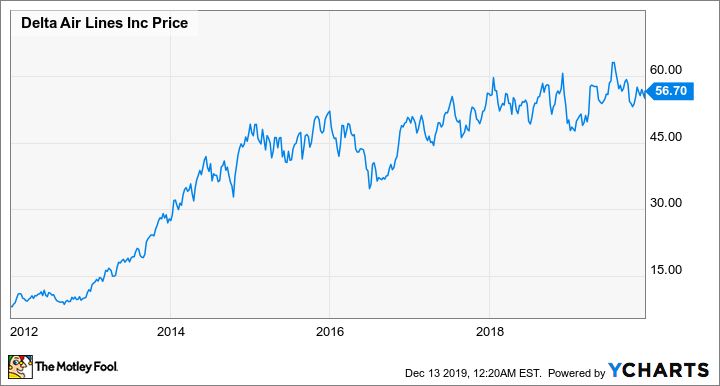Delta Air Lines (DAL 2.68%) has been a consistent outperformer in the airline industry in recent years. The airline has won a loyal following due to its industry-leading reliability and a reputation for good service. It also has a dominant position in its three biggest hub markets: Atlanta, Detroit, and Minneapolis-St. Paul.
As a result, Delta has reliably produced strong earnings and free cash flow over the past five years. At the company's investor day on Thursday, management predicted that 2020 will be another year of profit growth and solid free cash flow. That makes Delta Air Lines stock look like a great bargain at its current valuation of just eight times earnings.
Earnings on the rise
Delta Air Lines has delivered strong earnings growth over the past decade. Most dramatically, adjusted pre-tax income more than doubled from less than $2 billion in 2011 to $4.5 billion by 2014 as Delta honed its revenue-generation capabilities. As a result, the stock surged from around $8 at the beginning of 2012 to nearly $50 by the end of 2014.
EPS has continued to rise since then, driven by lower fuel prices, the reduction of the federal tax rate, share buybacks, and further progress on differentiating Delta's products and services to improve its pricing power. Adjusted EPS is on track to end up around $7 in 2019, more than double its 2014 level. Despite this continued EPS growth, Delta stock has stalled out, spending the last five years oscillating between $40 and $60.
Delta Air Lines stock performance. Data by YCharts.
This multiple compression is a strong indication that investors don't think Delta's current level of profitability and cash flow is sustainable. However, Delta Air Lines shows no sign of faltering.
More of the same next year
Back in October, Delta spooked investors when it projected a sharp slowdown in earnings growth for the fourth quarter -- even though much of the slowdown was related to one-time factors -- and stated that adjusted nonfuel unit costs were likely to rise 2% to 3% in 2020. But at the company's recent investor day, management provided a much more optimistic outlook.
First, while Delta does face cost headwinds from higher pay and other staffing investments to support growth, the carrier expects that fuel efficiency will improve by about 2% and pension costs will decline significantly due to strong asset returns in 2019. These factors will help mitigate the airline's underlying cost headwinds.
Second, management is confident in another year of solid top-line growth, with revenue rising 4%-6% year over year to around $49 billion. Continued revenue growth from Delta's credit card partnership with American Express, the expansion of ancillary businesses like aircraft and engine maintenance, and rising demand for premium seats should all help boost revenue.

Delta expects to achieve strong results again in 2020. Image source: Delta Air Lines.
The net result is that adjusted EPS should reach a range of $6.75 to $7.75. The low end of that range would represent a modest year-over-year decline, but the high end translates to double-digit EPS growth.
Delta Air Lines is also on track to deliver another year of strong free cash flow in 2020, despite investing heavily to upgrade its fleet. Adjusted free cash flow should reach $4 billion for the second consecutive year, up from $3.2 billion in 2017 and $2.4 billion in 2018.
The outlook beyond 2020 is very promising
If anything, Delta's prospects will improve further in the years after 2020. First, the airline has a huge long-term cost opportunity from simplifying its fleet and shifting more flights toward larger, more cost-efficient aircraft. The next steps in that journey are the retirement of Delta's MD-88 and MD-90 fleets in late 2020 and 2022, respectively.
Second, Delta will continue to diversify its revenue streams. In conjunction with some recent aircraft deals, it locked in contracts for thousands of future engine shop visits for other airlines. As a result, third-party maintenance revenue is on track to more than double by 2024 from the 2019 base of $880 million.
Third, revenue growth from the Amex partnership is set to surge in the years ahead, rising from $4 billion in 2019 and an estimated $4.4 billion in 2020 to an estimated $7 billion by 2022.
In short, despite Delta Air Lines' strong track record from the past decade, investors still seem to be underestimating the company. Delta is taking advantage of that situation by steadily repurchasing stock to shrink its share count and drive even faster EPS growth. It also pays a generous dividend that yields nearly 3%. This makes Delta stock extremely attractive.





